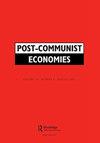Beliefs in the attributes of success in life and bribery in post-communist European countries
IF 1.8
3区 经济学
Q2 ECONOMICS
引用次数: 0
Abstract
ABSTRACT This article examines the influence of internal and external beliefs about the attribution of success in life on perceptions of corruption and corrupt behaviour. Using individual-level data from the Life in Transition Survey III for 21 former communist European countries, the results show that, on the one hand, beliefs that success in life is achieved eminently through effort and hard work and through intelligence, skills and competences reduce both the likelihood of perceiving corruption and acting corruptly. On the other hand, external attributes of life success achieved through political connections and breaking the law are associated with higher perceptions of corruption and bribery-related behaviour. These findings highlight the significant positive role of personal effort (rather than any help from unfair sources) and meritocracy in achieving success in life on the assessment of perceptions of corruption and corrupt behaviour in former communist European societies.后共产主义欧洲国家对成功的信仰和贿赂
本文章由计算机程序翻译,如有差异,请以英文原文为准。
求助全文
约1分钟内获得全文
求助全文
来源期刊

Post-Communist Economies
ECONOMICS-
CiteScore
4.90
自引率
18.20%
发文量
21
期刊介绍:
Post-Communist Economies publishes key research and policy articles in the analysis of post-communist economies. The basic transformation in the past two decades through stabilisation, liberalisation and privatisation has been completed in virtually all of the former communist countries, but despite the dramatic changes that have taken place, the post-communist economies still form a clearly identifiable group, distinguished by the impact of the years of communist rule. Post-communist economies still present distinctive problems that make them a particular focus of research.
 求助内容:
求助内容: 应助结果提醒方式:
应助结果提醒方式:


